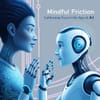As artificial intelligence (AI) becomes increasingly integrated into our daily lives, it's essential to consider the role of trust in our interactions with these systems. Trust is a complex and multifaceted concept that can be influenced by various factors, including the design and functionality of AI systems.
The concept of "mindful friction" refers to the intentional introduction of obstacles or challenges in the design of AI systems to encourage users to think more critically and reflectively about their interactions with these systems. By incorporating mindful friction into AI design, developers can help users calibrate their trust in AI systems and avoid over-reliance or blind trust.
One of the key challenges in designing AI systems that foster healthy trust is balancing the need for efficiency and automation with the need for transparency and explainability. AI systems that are too opaque or difficult to understand can erode trust and lead to skepticism, while systems that are too transparent or explainable can create information overload and undermine trust.
To address these challenges, developers can use various design strategies, such as providing clear and concise explanations of AI decision-making processes, offering users control over the level of automation and decision-making, and incorporating feedback mechanisms to allow users to correct or override AI decisions.
By incorporating mindful friction and designing AI systems that foster healthy trust, developers can help users develop a more nuanced understanding of AI capabilities and limitations. This, in turn, can lead to more effective and responsible use of AI systems, as well as a more informed and critically thinking public.
Ultimately, the goal of mindful friction is not to undermine trust in AI systems but to promote a more balanced and informed relationship between humans and technology. By designing AI systems that encourage critical thinking and reflection, we can build trust that is based on a deep understanding of AI capabilities and limitations, rather than blind faith or over-reliance.


